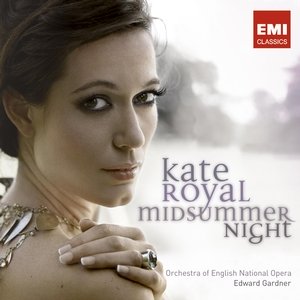
For her much-anticipated second EMI recital disc, the elegant British soprano Kate Royal (b. 1979) graces us with a collection of gorgeously sung arias from the last century. Inspired by the role of the Governess in Benjamin Britten’s gothic psychodrama The Turn of the Screw, which she sang with Glyndebourne on Tour in 2006, Royal hones in on 20th-century operatic females who, in her own words, share the Governess’ combination of “intensity and abandon.”
Her 13 arias depict “worlds in which the heroines are laid bare, vulnerable in their journey towards emotional fulfillment.” They are women “lost in love [or sometimes] trapped in a deeper trance-like state as they wrestle with their unsated desires.”
If that sounds like a passel of tortured women screaming their hearts out, rest assured that a lot of the music is far lighter and more rapturous than Royal’s words suggest. Balancing the torments of the Governess and the melodrama of Samuel Barber’s Vanessa are the delights of André Messager’s “Rossignol,” aka “Philomel,” from the operetta Monsieur Beaucaire, and the romantic tug of “Marietta’s Lied” from Erich Korngold’s opera Die tote Stadt.
From the first notes of the title aria, William Alwyn’s atmospheric “Midsummer night” from Miss Julie, it’s hard not be seduced by Royal’s gifts of tonal beauty and heartfelt commitment. Her singing has an emotional groundedness, an unforced connection between throat and heart that bespeak both purity and maturity. It’s a wonderful voice, from a woman whose beauty clearly extends far beyond surface allure. The three Britten selections, including excerpts from Paul Bunyan and Peter Grimes, are marvelous, as is Stravinsky’s “Nightingale aria” from The Nightingale. There’s nothing in this recital that I wouldn’t want to savor many times over.
Questions arise, however, as Royal approaches the top of her range. While her highs are definitely more solid and pleasing than in her first recital, there’s a desperation in the high C of “at the haunted end of the day” from William Walton’s Troilus and Cressida that suggests a fear deeper than that of the priestess. Other highs, such as the final B in the “Vilja-Lied” from Franz Léhar’s The Merry Widow and the B-flat in Dvořák’s “Song to the Silver Moon” from Rusalka, are held neither as long nor as rapturously as I would wish.
Inevitably, comparisons loom. Of current sopranos, Renée Fleming’s slower treatment of the Dvořák, which she recorded when close to Royal in age, sinks far deeper, and her B-flat is glorious. In Marietta’s unforgettable melody, no one can replace Sills, or, reaching back in time, Lehmann with Tauber. Who can outsing prima donna Leontyne Price in the Barber? And Royal only hints at the lightness and charm that one of Messsager’s chosen sopranos, Maggie Teyte, aka “l’Exquise” (the exquisite one), could still summon forth as she neared 60. But when all’s said and done, this is a glowing recital by a gifted soprano who matches beautiful sound with emotional depth.

